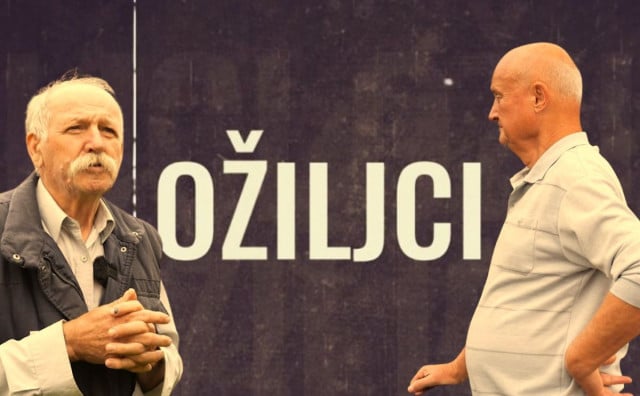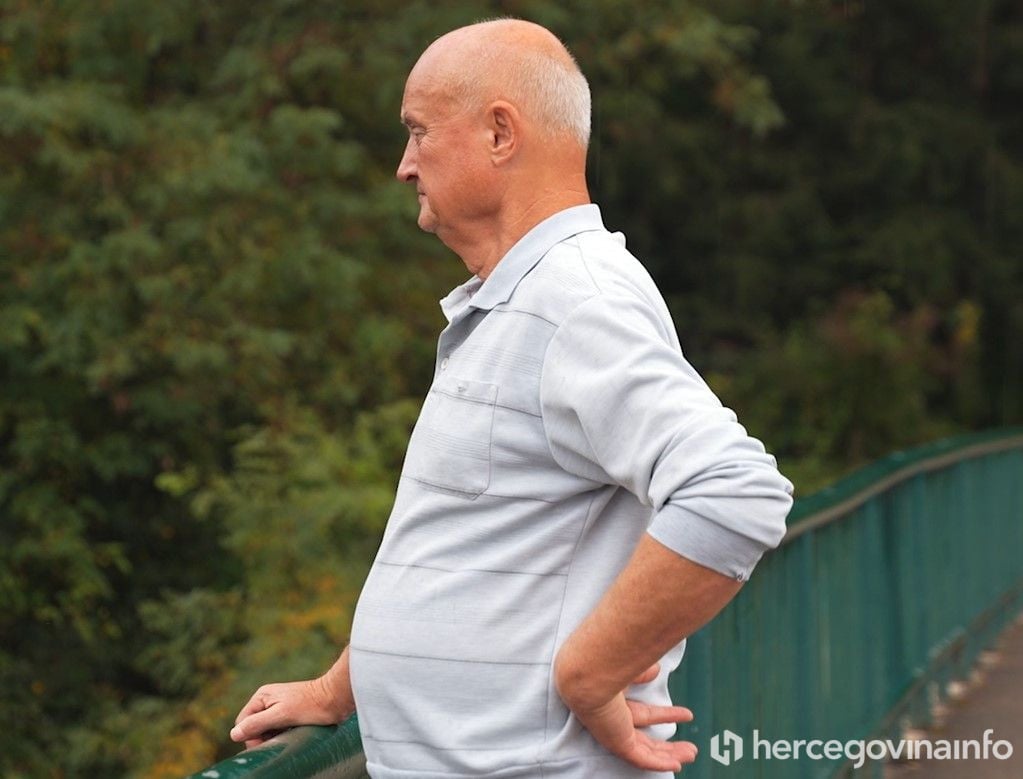SCARS Stories of Returnees from Sanski Most, Kotor Varoš, and Mostar

The returnee story, conceived as the last episode of the Scars series, brings together those who, after living abroad, where they ended during the whirlwind of war, returned to BiH, welcomed by numerous challenges, but also by deep connections with their roots.
In conversations with returnees from the area of Sanski Most, Kotor Varoš, and Mostar, despite the geographical and ethnic differences, several things are always similar. Returning to their own was a struggle full of challenges, but they successfully overcame it.
Although Croatian villages used to be full of life, today mostly older returnees remain in Kotor Varoš.
Kotor Varoš
Mato Marić from Vrbanjci near Kotor Varoš spent decades working in Germany, and upon returning to his birthplace, he rebuilt the house, which was destroyed during the war, with his own funds.
"There are no young people here. All that lives here are retired and old people. Some of those who stayed have maybe nine children in total", Marić complained to us.

He describes coexistence with neighbors as positive, but points to the problem of lack of infrastructure.
"As for living with the neighbors, there are no problems, we are all on good terms. The only problem is the infrastructure. For example, I have asphalt road in front of my house, but others can't get to their houses. The return of Croats is very difficult because those Croatian villages have no roads, are not maintained, and are difficult to rebuild. Before the war, there were over 11,000 Croats in Kotor Varoš, and now there are 180 of us. This means that the number tells how many Croats have returned to Kotor Varoš."
That things are not ideal is also shown by the problem faced by returnees in recent years. Illegal cutting of the forest that the authorities cannot or do not want to prevent.
"Private property is being destroyed without anyone being aware, roads are being destroyed, forestry and private individuals who have sawmills are destroying. We repair the roads with our private funds, and in a month, they destroy them again. If a ramp is installed, the communal police come and cut it off so they can further cut down the forest and continue their work."
A similar story is told by Zlatko Bujdo, who lives between Switzerland and the village of Podbrđe in the municipality of Kotor Varoš. He also rebuilt the estate without any help. Despite his efforts, he faces the neglect of institutions, which contributes to the feeling that returnees are left to fend for themselves. His home is surrounded by cut down forests and poorly maintained infrastructure.
"I have my own property here, I rebuilt the house on my own, I didn't get anything from anyone. Everything is self-financed. I have a property, a little forest, a little meadow. We do what we can ourselves. Two years ago, my forest was cut down. We called the commission, the police, the forester, the competent authorities, but nothing came of it. To this day, I have not even received the minutes for an insight. We don't even trust the institutions anymore, we are rejected," he commented indignantly.
"When the war started, my family was forced to move out, and I was abroad. I had real estate, the tractor disappeared, the weapons were taken, nobody returned anything. I asked around, but nothing. Ten years ago, my car was stolen from the garage, but nobody did anything. They did not abuse me physically, except for one threat when they intercepted me because of the forest, they asked me what I was doing there and told me to be careful. Before the war, Podbrđe was 98 percent Catholic. Now the mixed, Orthodox population predominates. There are few of us returnees, we spend weekends and holidays here, but there are few of us who live longer. We are constantly promised help for roads and water supply for every election vote, but after the vote, everything is forgotten. Forests have been cut down, springs are drying up, and if this continues, in ten years, there will be no water. What they cut that belongs to us, that’s fine, but what about the protection of nature and animals? No one does anything. The bears are coming, the does are gone, there aren't five does to count. About 300 hectares of forest closer to my property were illegally cut down, and even more was cut further away. About 85 percent of the forest has been cut down, it has been massacred," he said while showing us the cut down forest.
Sanski Most
Vojislav Kondić, who returned to the village of Podovi from Slovenia, restores property and takes care of preserving the memory of his father, who was killed during the war. Although returnees like him are trying to rebuild the community, institutions have shown little interest in support. Kondić maintains good relations with his neighbors and notes that ordinary people have always sought cooperation, regardless of past conflicts.
"Our father was killed here; he was killed in 1995. He was buried in the neighboring village because it was not possible to be buried here, he lived here alone. None of us four brothers were present, the oldest brother was in Germany, I was in Velenje, the third brother was in Belgrade, and the fourth was in Ljubljana. I made the decision in 2002 to return here, I moved my father from the Kozice cemetery. We drove him to Banja Luka, where the cause of death was determined and then he was moved to our cemetery."
Mitar Popović, who also returned to Podovi from Slovenia, talks about the unprocessed war crime that affected his family, but he is grateful for the donation from the Republic of Srpska for the reconstruction of the house. Although the returnees are a minority, he points out that they live without any problems in the community.
"My mother was killed here, as well as two, i.e., three uncles, and a cousin from the neighboring village. A total of five were killed here. It happened on September 21st, 1995. No one has been prosecuted for that crime. We made statements, the three of us from here, but nothing happened. I don't know if the procedure has ever been initiated, but there is no knowledge of who did it."
Mostar
Enes Rahimić, a former handball player and private entrepreneur, has been building a life in Gubavica near Mostar since his return from Switzerland.
He built an estate in the karst, which at first was meant to serve only him and his family members, but over time he repurposed the estate for tourism.
"This house was originally intended for me and my brothers, as a family home and a place for friends to gather. However, everything went in a different direction and the facility expanded, so now you can make money from it. If that's a good way to get back on track, then I've succeeded at it. I spent six and a half years in Switzerland, and that helped me when I started this realization. It is a country where the law is respected, everything is regulated, from the smallest to the biggest things", he noted and compared the situation in that country with what he found in Bosnia and Herzegovina.
Although he has achieved financial stability, he faces problems such as bad roads, the construction of solar power plants near the property and frequent water outages.
"People have returned en masse because this suburban settlement is outside Mostar, close to everything. However, the returnees got homes and houses, but we all know that you cannot live only by a house. The road is terribly bad, the water system does not work properly. This year was difficult, there were periods when we were without water for 15 days, and in Herzegovina, when the temperature is over 40 degrees, it is a big problem. I had massive damage. As far as solar energy is concerned, as a human being I have no moral right to forbid anyone to build a solar plant, but I can ask investors to, if they are already doing it in my area, do it according to the law. If it has to be solar, let's make an agreement, to install two or three, and stop there. Living space must be left for this people because I do not intend to go anywhere. I came here, I want to live, work and die here," Rahimić told investors.
Enes expresses his desire to attract his family and young people from the diaspora, calling on politicians to recognize the importance of emigration for the future of Bosnia and Herzegovina.
"My greatest wish is for my brothers to be with me. That's when I'm happiest. When my brothers are here, then the children will have the desire to return. This is an opportunity to send a message to politicians - the diaspora is important. Our people are educated, have good jobs and earn good money. Attract them, fix the legal bases and let the youth come back. We have everything we need for BiH to become the second Switzerland in Europe."
Vezani članci
